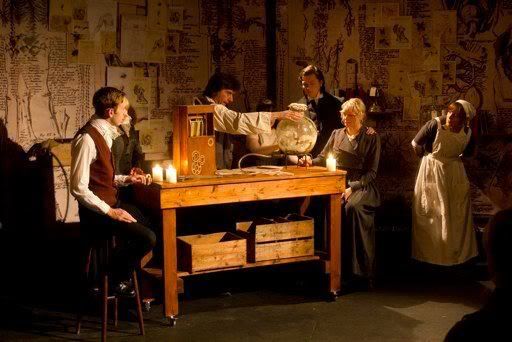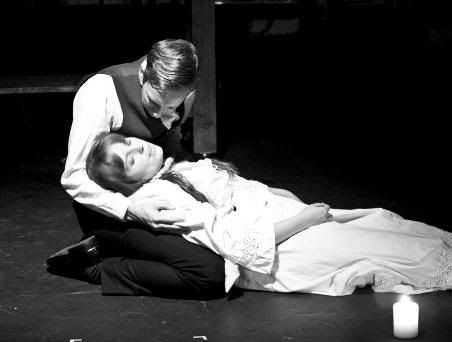THEATRE REVIEW: An Experiment with an Air Pump, Great Olive Theatre, London
As I've mentioned on here before, my review of the play that my friend is currently appearing in. Also posted on the play's Facebook page and website.
On paper, Shelagh Stephenson’s play An Experiment with an Air Pump initially appears daunting. Inspired by the 1768 painting An Experiment on a Bird in the Air Pump by Joseph Wright 'of Derby', the central plot revolves around the lives of two families - living in the same house but two hundred years apart, challenging ethics, medical research, and, ultimately, their own relationships with each other. Add to this a detective story, and the result is an intelligent, emotional, and macabre tale told with passion, wit, and depth. It is even more challenging for the actors, many of whom double up in roles: one from the present and one from the past, and move effortlessly between two centuries.

The cast in the opening scene. Photography: Alexander Ford
This is not an easy play to follow. It is long, complex, and subtly written, woven intricately together like delicate spider silk, and the use of scientific jargon may confuse the audience - or perhaps that is the intention: are we meant to understand it, or are we to just accept what we are told? Thankfully, we have handyman Phil, the likeable if naïve Everyman, whose rambling philosophy poses those ever-pertinent questions such as whether or not UFOs actually do exist.
It would be difficult to single out any one particular performance for praise. I can honestly say that this is a truly ensemble piece; and under Liise Smith’s remarkable direction, all seven actors gave us characters that evoked genuine emotional reactions from the audience.
Olivia Hunter’s touching portrayal of the hump-backed maid Isobel was a perfect balance of intelligence and vulnerability. Her large, expressive eyes spoke volumes: her cruel and tragic seduction by the brilliant, yet ruthless young scientist Thomas Armstrong (Mason Kayne), becoming excruciatingly painful to watch.
Noah James’s gentle Roget had a pleasing touch of the dandyish Byronic romantic hero about him. I particularly enjoyed his scenes with Armstrong, as these two bright young men are thrown together by circumstances and yet are barely able tolerate each other’s company.
Steven Lello and Holly Clarke played both husband and wife pairings, spanning the two centuries. This couple make a delicious combination: likeable, funny, and with real chemistry between them; in particular as Lello’s well-meaning yet blinkered scientist, Fenwick and his neglected, frustrated wife, Susanna. Billie Fulford-Brown is adorable as Maria, the youngest Fenwick daughter, delivering her set monologues with youthful conviction.
Although Rae Brogan excelled at conveying Harriet Fenwick’s passionate, spirited nature, I personally felt that she was less convincing in her 1999 role of Kate. The jaded coldness that this character seemed to demand failed to materialise during the preview night.
Whilst it would be easy to portray Armstrong as a one-dimensional villain, Mason Kayne tries to avoid this, maintaining an intense, disturbing stillness throughout his scenes. His seduction of Isobel belies his ulterior motive: he is fascinated by her humped back and wants to examine it by any means possible. His last tragic scene with Isobel, performed with an intense silence, gave us the final proof that this man’s medical ethics know no boundaries. My only real concern is that his diction wasn’t always sufficiently clear in the early scenes.

Armstrong (Mason Kayne) and Isobel (Olivia Hunter) Photography: Alexander Ford
In contrast, Phil was a breath of fresh air after the intensity of Armstrong. Kayne brought the right mix of comedy and pathos to the modern scenes with his delivery of Phil’s layman philosophy.
The size of the theatre is certainly ideal for the play; the intimacy of this production would be lost with larger staging. The audience are able to study every aspect of the production in detail, just as a scientist gazes in wonder at a discovery before him. This beautiful production has clearly been tenderly nurtured by all those involved, aided by Cara Newman’s simple yet imaginative set.
Having seen this performance on the opening preview night, I intend to see the final performance on 12th November: it will be interesting to compare the two.
Would I recommend this production? Yes. Amidst the plethora of fringe productions currently being performed around London, there will usually be one or two that create an impact both visually and emotionally and stay with you long after the performance ends, and this is one of them. An Experiment with an Air Pump is beautifully staged: with its unusual venue, tucked away in a leafy north west London suburb, and an excellent cast, this play is well worth experiencing.
“An Experiment with an Air Pump” runs at the Lion and Unicorn Theatre until 12th November 2011.